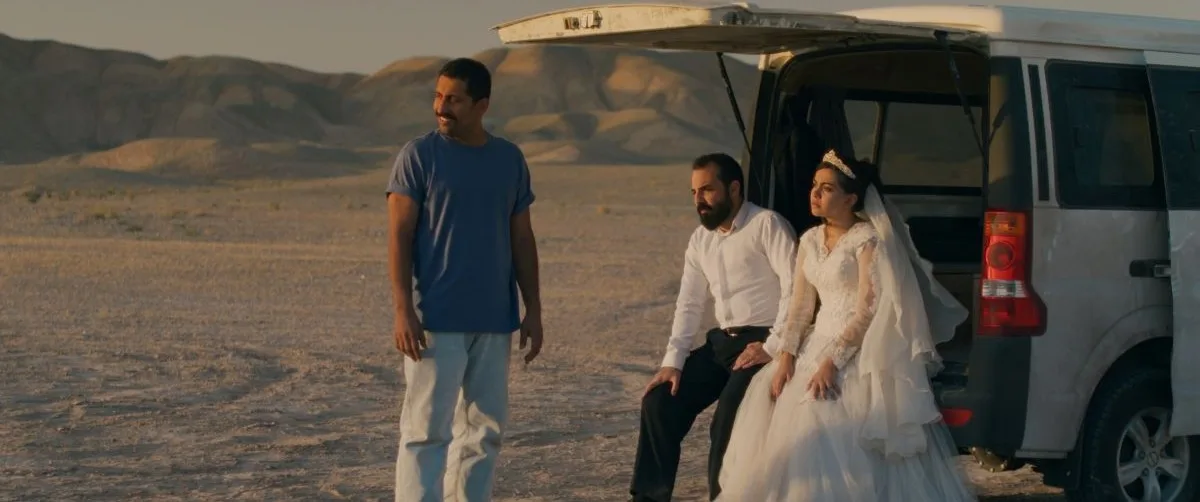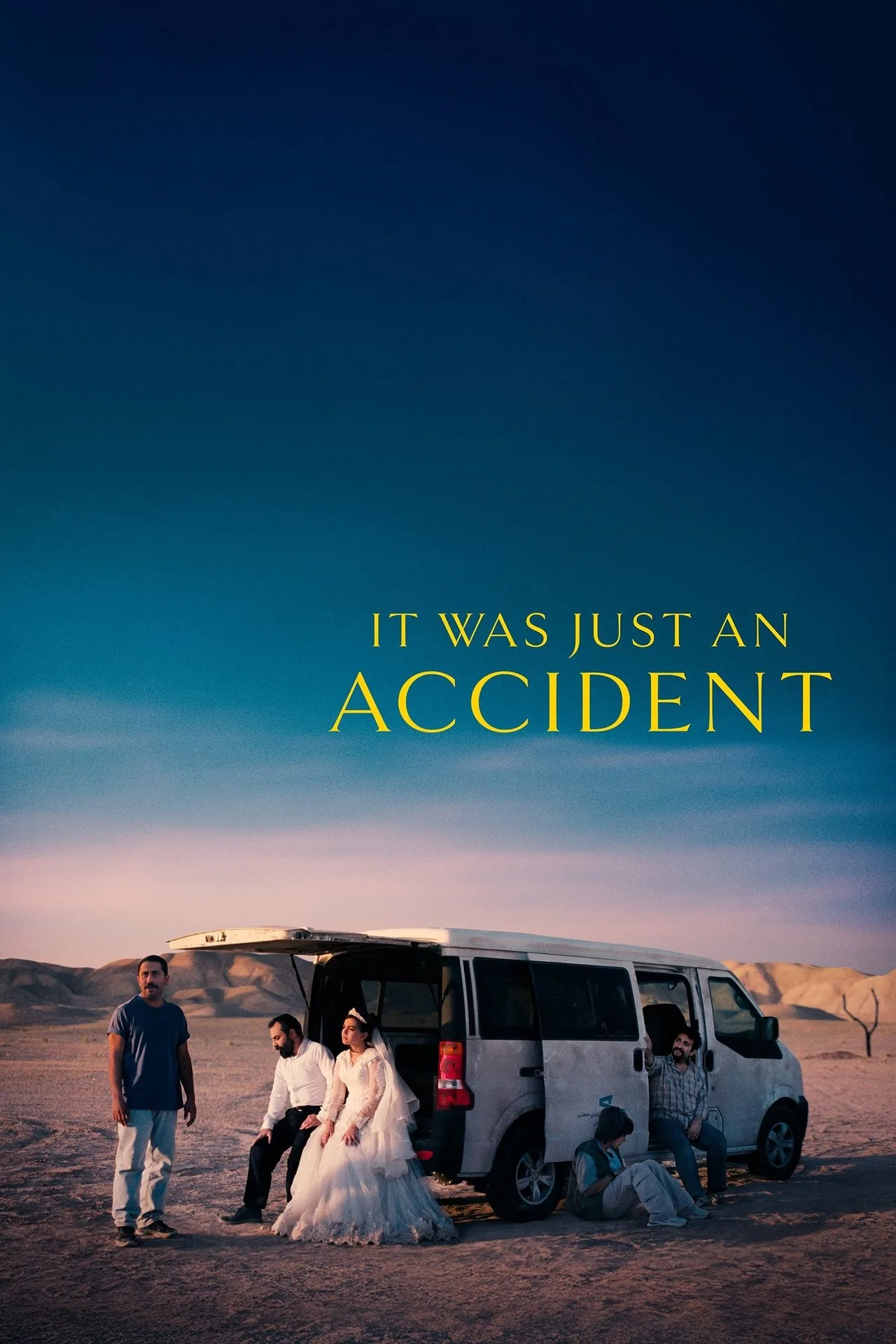Despite its title, you can’t find a more controlled film than Jafar Panahi‘s Palme d’Or winner “It Was Just an Accident.” From the opening shot, featuring a husband (Ebrahim Azizi) and his pregnant wife driving at night on a dirt road, we’re fully in the Iranian auteur’s grasp. The couple’s child bounces in the backseat to the pop music blaring from the radio, forming a sweet family drive that’s interrupted by the dad running over a dog. Despite the daughter’s sadness over the canine, her mother is unfazed. She blames it on God and the lack of streetlights, which makes animals common prey on this road. “It was just an accident,” she says. Much like the creatures whose lives are destroyed on this street, by virtue of this misfortune, their lives will be diverted.
Several miles after the impact, their car breaks down outside a modest factory. An employee offers to fix their car while his co-worker Vahid (Vahid Mobasseri) talks on the phone in a backroom. Before he sees the driver, Vahid hears the shuffle and squeak of a prosthetic leg. His genial visage fades, and he sneaks around the corner to get a better look. From his vantage point, we only see the driver’s legs as he looks for a toolbox. When he asks for help, Vahid, hiding in another room, hooks his finger into his cheek to change his voice. Vahid believes this man is Eghbal, a former intelligence officer who tortured him years ago in prison.
Panahi’s “It Was Just an Accident” is a film about prisons, the ones time and memory make for us, and the hard-to-find psychological keys that’ll release us. Because how do you remain human when your humanity has been stripped? How can you not resort to fighting with the opposition’s worn-out tools? It seems that’s all you have left.
These are questions Panahi poses to his characters, who, through a simple read, could all be interpreted as versions of him. By extension, then, these can also be interpreted as questions he’s posed to himself. The director was first imprisoned in 2010 for two months, enduring mistreatment by his captors and hearing about threats against his family. When he was finally released, he was put on house arrest and banned from making movies, a ban he continues to defy to this day.
Panahi’s “It Was Just an Accident” organically takes shape when Vahid decides to act. He tracks the driver to a repair shop, hits him with his car, abducts him from the street, and drives out to the desert, where he digs a hole with the intent of burying him alive. When the man protests that he can’t be Peg Leg because his scars are recent, doubt creeps into Vahid’s mind. Does he actually have the right man? While the thought troubles Vahid, Panahi doesn’t leave much uncertainty. In the opening scene, the daughter makes mention that no one is allowed to come over to their home and that they must avoid the neighbors. Early on in the movie, Panahi also immerses the driver’s face in deep red lighting, a trick he will return to again, in a way that recalls Alfred Hitchcock’s “Marnie,” another film that intermingles trauma with memory.
The mystery of the man, therefore, is of little consequence to Panahi. He’s far more interested in the emotions this man’s reemergence has on those abused by him. Rather than risk killing a potentially innocent man, Vahid seeks confirmation. A friend sends him to a photographer named Shiva (Mariam Afshari), who was also a political prisoner. When Vahid finds Shiva, she just so happens to be doing wedding photographs for Ali (Madj Panahi) and Goli (Hadis Pakbaten), the latter of whom was also a prisoner. They all pile into Vahid’s van to look for another former detainee, the hot-headed Hamid (Mohamad Ali Elyasmehr). Because they were all blindfolded when they knew Peg Leg, their perception of him is sensory: Vahid identifies him by sound, Shiva by smell, and Hamid by touching the scars on the man’s leg. The invocation of the sensorial intimates that these people are being governed as much by instinct and emotion as by logic, inspiring snap reactions fueled by anger.
Nevertheless, “It Was Just an Accident” isn’t a vindictive picture. It’s actually surprisingly funny. This colorful collection of characters—a laborer, a bride and groom, a photographer, and a casual guy—all thrown together in a tiny space for their differences to arise and take shape as they work through several amusing obstacles. The van breaks down, a birth happens, bribes are given out, and disagreements lead to winking reveals. While some of the humor arises from the witty script, editor Amir Etminan’s wonderful pans are equally as silly.
Consequently, the sense of space in this picture is two-fold. While it can evoke comedy, it can also inspire tension. Because there are several prisons in this film: there’s the van’s wide toolbox they hide the man in, which recalls Hitchcock’s “Rope,” the van itself, and the vast desert they take him to. Panahi’s visual handling of these places culminates in Hamid’s desert rant—a long, unbroken shot that cycles through three compositions by merely panning back and forth—wherein he bristles at each person for being a neutral observer, someone willing to erase the past, or for being generally passive. Each represents the measures individuals take under a repressive regime, not just to survive. But also to remain human.
And so, the question at the center of “It Was Just an Accident” is whether these men and women will resort to the same torturous tactics that were imposed on them and whether such means will actually help them conquer their respective traumas. Each actor acutely wrestles with their character’s respective moral dilemma with such openness that it’s easy to miss just how well-crafted each performance is. Through cinematographer Amin Jafari’s sense of environment, the script’s agile tonal changes, and the attentive cast, we are enthralled from minute one until the end of an intense thriller that operates quietly but with no less punch. As such, there are no wasted shots and no squandered moments in this picture because it understands that cinema is life, imbued with the power to rediscover the past, to protect the present, and to imagine a future. “It Was Just an Accident” is doing all those things at once, for its characters and its creator.
This review was filed from the premiere at the Telluride Film Festival on September 2. It will be released on October 15, 2025.




















